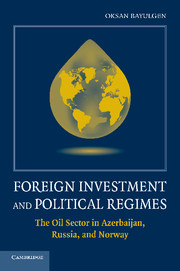Book contents
- Frontmatter
- Contents
- List of Figures and Tables
- Acknowledgments
- 1 Introduction
- 2 Political Risks in Oil Investments: A History of Antagonistic Interdependence Between Companies and Host-Governments
- 3 With or Without Democracy? The Political Economy of Foreign Direct Investments
- 4 Curse or Blessing? Effects of FDI on Development
- 5 Azerbaijan: One-Stop Shopping
- 6 Russia: Two Steps Forward, One Step Back
- 7 Norway: Icon of Stability
- 8 Beyond Three Cases and Oil
- 9 Conclusion
- References
- Index
2 - Political Risks in Oil Investments: A History of Antagonistic Interdependence Between Companies and Host-Governments
Published online by Cambridge University Press: 03 May 2010
- Frontmatter
- Contents
- List of Figures and Tables
- Acknowledgments
- 1 Introduction
- 2 Political Risks in Oil Investments: A History of Antagonistic Interdependence Between Companies and Host-Governments
- 3 With or Without Democracy? The Political Economy of Foreign Direct Investments
- 4 Curse or Blessing? Effects of FDI on Development
- 5 Azerbaijan: One-Stop Shopping
- 6 Russia: Two Steps Forward, One Step Back
- 7 Norway: Icon of Stability
- 8 Beyond Three Cases and Oil
- 9 Conclusion
- References
- Index
Summary
The oil industry has historically been one of the most globalized in the world. Oil is a key fuel in industrial production, as well as a vital ingredient in the manufacture of a wide range of products. It is the backbone of capital-intensive industrial production, as it is the energy source for transportation, industry, military, communications, mechanized agriculture, and countless other services. Not only in terms of trade, but also in terms of oil exploration and production, the oil sector has historically been highly internationalized, involving many governments and multinational oil corporations.
The reason I focus on oil investments in this book is because they provide a hard case to test the relationship between politics and the ability to attract Foreign Direct Investment (FDI). Generally, it is assumed that foreign oil companies do not have political preferences. Due to severe competition in the parceling out of scarce oil resources in the world as well as the high returns associated with oil investments, foreign investors seem indifferent to political regimes as long as they provide stability for their projects. This is not to say that oil companies do not face any political risks in their interactions with host governments. In fact, given the structure of the industry, political risks are arguably the highest facing any investor in the global economy. Even so, one of the most prominent international business theories posits that the degree of political risk is determined not by the domestic political structure but by the relative market power and bargaining positions of the host governments and the multinational corporations with respect to one another.
- Type
- Chapter
- Information
- Foreign Investment and Political RegimesThe Oil Sector in Azerbaijan, Russia, and Norway, pp. 16 - 40Publisher: Cambridge University PressPrint publication year: 2010



